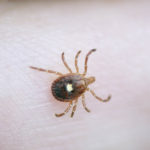Why Does My Mouth Tingle?
Do you have any idea why my mouth itches and tingles when I eat apples?
Andrew Weil, M.D. | September 11, 2017

If you have an allergy to pollen, your problem could be oral allergy syndrome. This condition isn’t well known but can cause an itchy mouth, swollen lips and a scratchy throat lasting from a few minutes to hours. According to the American College of Allergy, Asthma & Immunology (ACAAI), this problem also is known as pollen-food syndrome and is caused by cross-reactivity to allergens found in pollen, raw fruits, vegetables, and some tree nuts. Your immune system recognizes the similarity of proteins in pollen to those in the food and sets off an allergic response – the itching and tingling you experience. Because the proteins are changed by heating, the immune system no longer recognizes them, so that people with this syndrome are usually able to eat the same fruits or vegetables when they’ve been cooked.
These allergies tend to occur in older children, teens and young adults who have eaten the fruits or vegetables trouble-free for years. Young children generally aren’t affected.
People with oral-allergy syndrome who react to apples are frequently allergic to birch pollen that circulates in the air in springtime. They may also develop symptoms when they eat pears, almonds, hazelnuts, carrots, celery, kiwi, cherries, peaches and plums. And they may react only to some types of apples and not to others.
If you’re allergic to grass pollen, you can develop allergic symptoms in the summer to a number of fruits and vegetables, including celery, melons, oranges, peaches and tomatoes. A ragweed pollen allergy (hayfever) may trigger reactions in the fall to bananas, cucumbers, zucchinis, melons and sunflower seeds.
Even though certain foods may make your mouth itch or tingle when you eat them, with oral allergy syndrome, the symptoms usually subside once you’ve swallowed or taken the food out of your mouth; treatment isn’t needed. Studies suggest, however, that more typical food allergy symptoms such as nausea, vomiting and abdominal pain sometimes develop with oral allergy syndrome. It’s estimated that this happens in nearly nine percent of patients and that these symptoms can progress to anaphylactic shock in 1.7 percent of cases. If you experience anything more severe than itching or tingling, especially difficulty swallowing or breathing, seek help. If the problem seems to be getting more pronounced over time you should consider consulting an allergist. Skin testing can determine a seasonal allergy and confirm a cross-reactivity to fresh fruits and vegetables. Sometimes, allergy shots can help prevent the symptoms.
Short of getting the desensitization shots, about all you can do to reliably treat the itching and tingling of oral allergy syndrome is to avoid the foods that set it off. Peeling fruits or vegetables may help but doesn’t always work. Antihistamines may help head off symptoms if you take them before eating the problem foods and may relieve symptoms when they develop. Be sure to see an allergist if you develop mild symptoms when eating nuts, since this can indicate a greater risk of anaphylaxis.
Andrew Weil, M.D.
Sources:
David E. Cohen et al, “Oral Allergy Syndrome (Pollen-Food Allergy Syndrome), Dermatitis, March/April 2015, doi: 10.1097/DER. 0000000000000087
K. Hoffmann-Sommergruber et al, “Position paper of the EAACI: food allergy due to immunological cross-reactions with common inhalant allergens.” Allergy, July 20, 2015, DOI: 10.1111/all.12666











